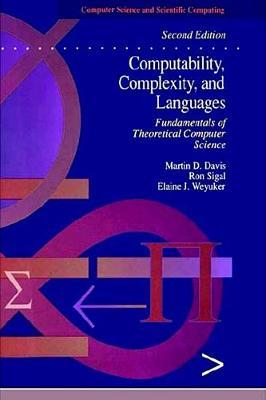Overview
This introductory text covers the key areas of computer science, including recursive function theory, formal languages, and automata. It assumes a minimal background in formal mathematics. The book is divided into five parts: Computability, Grammars and Automata, Logic, Complexity, and Unsolvability.
Full Product Details
Author: Martin Davis (Courant Institute of Mathematical Sciences of New York University, New York, U.S.A.) ,
Ron Sigal (Consultant, New Haven, Connecticut, U.S.A.) ,
Elaine J. Weyuker (AT&T Labs Research, Florham Park, New Jersey, U.S.A.)
Publisher: Elsevier Science & Technology
Imprint: Morgan Kaufmann Publishers In
Edition: 2nd edition
Dimensions:
Width: 15.20cm
, Height: 3.90cm
, Length: 22.90cm
Weight: 0.970kg
ISBN: 9780122063824
ISBN 10: 0122063821
Pages: 609
Publication Date: 18 March 1994
Audience:
Professional and scholarly
,
Professional & Vocational
Format: Paperback
Publisher's Status: Active
Availability: In Print

This item will be ordered in for you from one of our suppliers. Upon receipt, we will promptly dispatch it out to you. For in store availability, please contact us.
Reviews
If there is a single book on the theory of computing that should be in every college library collection, this is it. Although written as a text for an advanced undergraduate course in theoretical computer science, the book may serve as an introductory resource, or the foundation for independent study, in many areas of theoretical computing: grammars, automata theory, computability, complexity theory, and unsolvability. The beauty of this book is that the breadth of coverage is complemented with extraordinary depth. -CHOICE Theoretical computer science is often viewed as a collection of disparate topics, including computability theory, formal language theory, complexity theory, logic, and so on. This well-written book attempts to unify the subject by introducing each of these topics in turn, then showing how they relate to each other... This is an excellent book that succeeds in tying together a number of areas in theoretical computer science. -COMPUTING REVIEWS
"""If there is a single book on the theory of computing that should be in every college library collection, this is it. Although written as a text for an advanced undergraduate course in theoretical computer science, the book may serve as an introductory resource, or the foundation for independent study, in many areas of theoretical computing: grammars, automata theory, computability, complexity theory, and unsolvability. The beauty of this book is that the breadth of coverage is complemented with extraordinary depth."" —CHOICE ""Theoretical computer science is often viewed as a collection of disparate topics, including computability theory, formal language theory, complexity theory, logic, and so on. This well-written book attempts to unify the subject by introducing each of these topics in turn, then showing how they relate to each other... This is an excellent book that succeeds in tying together a number of areas in theoretical computer science."" —COMPUTING REVIEWS"
If there is a single book on the theory of computing that should be in every college library collection, this is it. Although written as a text for an advanced undergraduate course in theoretical computer science, the book may serve as an introductory resource, or the foundation for independent study, in many areas of theoretical computing: grammars, automata theory, computability, complexity theory, and unsolvability. The beauty of this book is that the breadth of coverage is complemented with extraordinary depth. -CHOICE Theoretical computer science is often viewed as a collection of disparate topics, including computability theory, formal language theory, complexity theory, logic, and so on. This well-written book attempts to unify the subject by introducing each of these topics in turn, then showing how they relate to each other... This is an excellent book that succeeds in tying together a number of areas in theoretical computer science. -COMPUTING REVIEWS
Author Information
Born in New York City in 1928, Martin Davis was a student of Emil L. Post at City College and his doctorate at Princeton in 1950 was under the supervision of Alonzo Church. Davis's book Computability and Unsolvability (1958) has been called ""one of the few real classics in computer science."" He is best known for his pioneering work in automated deduction and for his contributions to the solution of Hilbert's tenth problem. For this latter work he was awarded the Chauvenet and Lester R. Ford Prizes by the Mathematical Association of America and the Leroy P. Steele Prize by the American Mathematical Society. In 1983 he was a Guggenheim Foundation Fellow and in 2005 he received the Herbrand Prize from the Conference on Automated Deduction. His books have been translated into a number of languages including Russian and Japanese. Davis has been on the faculty of the Courant Institute of Mathematical Sciences of New York University since 1965, was one of the charter members of the Computer Science Department founded in 1969, and is now Professor Emeritus. He is currently a Visiting Scholar at the University of California, Berkeley. Ron Sigal is an independently employed software developer who has held positions at Yale University, Lafayette College, Hofstra University, and the University of Catania in Italy. He has a PhD in computer science and has published in the areas of mathematical logic, robotics, and programming languages. Elaine Weyuker is a researcher at AT&T Labs who specializes in empirical software engineering and testing research. She is a member of the National Academy of Engineering, an IEEE Fellow, an ACM Fellow, and an AT&T Fellow. She is the co-chair of the ACM Committee on Women in Computing (ACM-W) and a member of the Coalition to Diversify Computing's steering committee. She was the 2004 recipient of the Harlan D. Mills Award, the Rutgers University 50th Anniversary Outstanding Alumni Award, and the AT&T Chairman's Diversity Award. Before moving to AT&T, she was a computer science professor at the Courant Institute of Mathematical Sciences of NYU.



